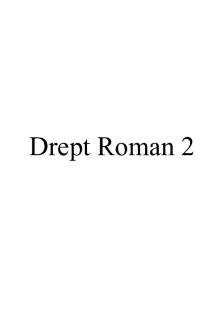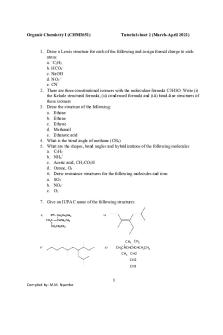Roman Tutorial 2 PDF

| Title | Roman Tutorial 2 |
|---|---|
| Course | Roman Law of Property & Obligations 1 |
| Institution | University of Glasgow |
| Pages | 5 |
| File Size | 116 KB |
| File Type | |
| Total Downloads | 53 |
| Total Views | 122 |
Summary
Tutorial 2...
Description
Roman Tutorial 2: Question 1: Usufruct: The legal right of using and enjoying the fruits or profits of something belonging to another. The right of enjoying all the advantages derivable from the use of something that belongs to another as far as is compatible with the substance of the thing not being destroyed or injured. · Usufruct-personal servitudes- The right to use, and to the fruits, with the thing to be returned unimpaired. when he takes the fruits, he becomes owner; a real right. If the usufructuary dies , then the usufructuary comes to an end. How does a usufruct gather fruits?- mutually advantage arrangement- it passes by taking i.e. the usufructuary has to take or gather the fruits and then become his property. If he doesn’t gather or take then they are not his. Ownership does not belong to the usufructuary until he gathers them. Justinians institutes 2.1.36-37. · The young of animals immediately go to the usufructuary-exception to the rule.
The eggs –This is specification. It would appear that the eggs belong to Andrews as soon as it is boiled. it cant be reduced Specificatio- Destruction of identity via manufacturing process (or: ‘new thing’) Becomes manufacturer’s. 2 sides of jurists with 2 opinions-the maker is the owner unless the thing is reducible to the materials but if the maker contributed anything of his own then it will belong to him regardless of reducibility-justinian said this-in this case the eggs are not reducible and he added something therefore andrew owns it · Vinditicio-claiming ownership of eggs-carl claims the eggs . Cucumber plant The cucumber plant become Bob’s by accession, as they are rooted in his land. Accession occurs where two items "mingle" and become a new item · Throwing out the window-abandoned property-available to first taker-drive/actus
Drive · Actus(drive) allows you and livestock pass land whereas iter allows you just to walk across land-actus rolls iter up with it, via is the right to a road across someones land, actidusic-right to pass water over someones land · Servitude=praedial servitude-real rights Praedial servitudes: Burdens and benefits pass with the land Servitude to be exercised civiliter (‘politely’) ‘Dominant’ and ‘servient’ estates servitudes do not impose any duty to act on the servient estate owner. A servitude over your property didn’t require you to do something ie damage to road is paid by the servitude not the owner of the land
Bob’s duty is to allow Andrew to repair the servitude. Andrew owns a piece of property and someone has taken his property away from him. If bob will not allow him to repair the servitude then Andrew can raise action against Bob in which he asks for his property back. if he can go around the cucumber plants, he is fine and still has his servitudes. ·With actus he would be expected to go another route · Actio confessiria aka vinditio servitude-to establish it exists · Not entitled to take lawnmower over land-is active destruction. Photo · Accession-photograph-ink is treated like a painting here-photo can be recreated-ink accedes to the paper . Accession occurs where two items "mingle" and become a new item. Ink is mingled with paper. Possible that in the mingling the identity of one of the things is extinguished. · What if? Removing them maliciously – for purposes of property this doesn’t matter. No impact.possibly thef which would make him answerable in delict. if the manufacturer is in bad faith e.g. steals and makes something from it . he still becomes the owner even if he stole the materials.
If Andrew is exercising a servitude that he doesn’t have then he is pretending to own property that he doesn’t have. · If he didn’t save them it is unique and wont be created again-paper accedes to the photo · Separation of fruits · Carl will raise vindicatio when david takes it from his shelf
Question 2 First question : is an obligation created ? and what kind? · This is a deposit- hand over of property for safekeeping .
Depositor hands over a piece of property to the depositee The understanding is the depositee will keep the property safe for the depositor. It is a good faith contract It is a bilateral contract- both parties have duties in some respect.
high standard of care from depositor and depositee has low standard of care · Does this person benefit from contract?-high and if they don’t then not a high standard of care · Giving the tenner-muttum a type of Real Contract ‘Real’-relating to property Tend to take place in a closer circle, e.g. between friends or neighbours Tend not to be commercial contracts
‘Obligations contracted by conduct’ mutuum - Loan for consumption. ownership passes-her money she can spend on what she likes
Handing over of the thing creates the obligation It is expected that the thing being transferred will be consumed.
Ownership passes. A unilateral contract. Not a good faith contract. Lender has no duty. Performance falls all on one side. A gratuitous contract.
· £20 by way of mandate also – mandate agree to perform gratuitous service · She has a low standard of care so wouldn’t be liable that it was outside and got damaged. Depositee has the duty to keep the thing safe and not damage it deliberately. Will be liable only if damaged deliberately. depositee should not use the thing – she should not be using to cover the oil stain. · Not entitled to park it over the stain as cant use for own benefit. When the depositee uses the depositors object- thef.
· If she is aware of oil leak then should pay but if she is unaware-then still no as wouldn’t expect someone to know that. Depositors duty; to pay any expenses . pay for any damage the thing has caused. They will be liable for his/hers carelessness/negligence. · She is entitled to get £20 back but can’t get money for damage of paint · If she gives her the earrings then still no as she isn't giving back the same kind of thing-not earrings or euros-needs to repay pounds · Tile falling off then not liable as she didn’t intend it still-was an accident...
Similar Free PDFs

Roman Tutorial 2
- 5 Pages

Curs Drept roman 2
- 81 Pages

Evidencia 2. Samantha Roman
- 13 Pages

Tutorial-2
- 1 Pages

Tutorial 2
- 3 Pages

Tutorial #2
- 2 Pages

Tutorial 2
- 1 Pages

Tutorial 2 - .....
- 3 Pages

Tutorial 2
- 3 Pages

Tutorial 2
- 2 Pages

Roman Empire
- 3 Pages

Drept roman
- 76 Pages

ROMAN ARCHITECTURE
- 64 Pages
Popular Institutions
- Tinajero National High School - Annex
- Politeknik Caltex Riau
- Yokohama City University
- SGT University
- University of Al-Qadisiyah
- Divine Word College of Vigan
- Techniek College Rotterdam
- Universidade de Santiago
- Universiti Teknologi MARA Cawangan Johor Kampus Pasir Gudang
- Poltekkes Kemenkes Yogyakarta
- Baguio City National High School
- Colegio san marcos
- preparatoria uno
- Centro de Bachillerato Tecnológico Industrial y de Servicios No. 107
- Dalian Maritime University
- Quang Trung Secondary School
- Colegio Tecnológico en Informática
- Corporación Regional de Educación Superior
- Grupo CEDVA
- Dar Al Uloom University
- Centro de Estudios Preuniversitarios de la Universidad Nacional de Ingeniería
- 上智大学
- Aakash International School, Nuna Majara
- San Felipe Neri Catholic School
- Kang Chiao International School - New Taipei City
- Misamis Occidental National High School
- Institución Educativa Escuela Normal Juan Ladrilleros
- Kolehiyo ng Pantukan
- Batanes State College
- Instituto Continental
- Sekolah Menengah Kejuruan Kesehatan Kaltara (Tarakan)
- Colegio de La Inmaculada Concepcion - Cebu


